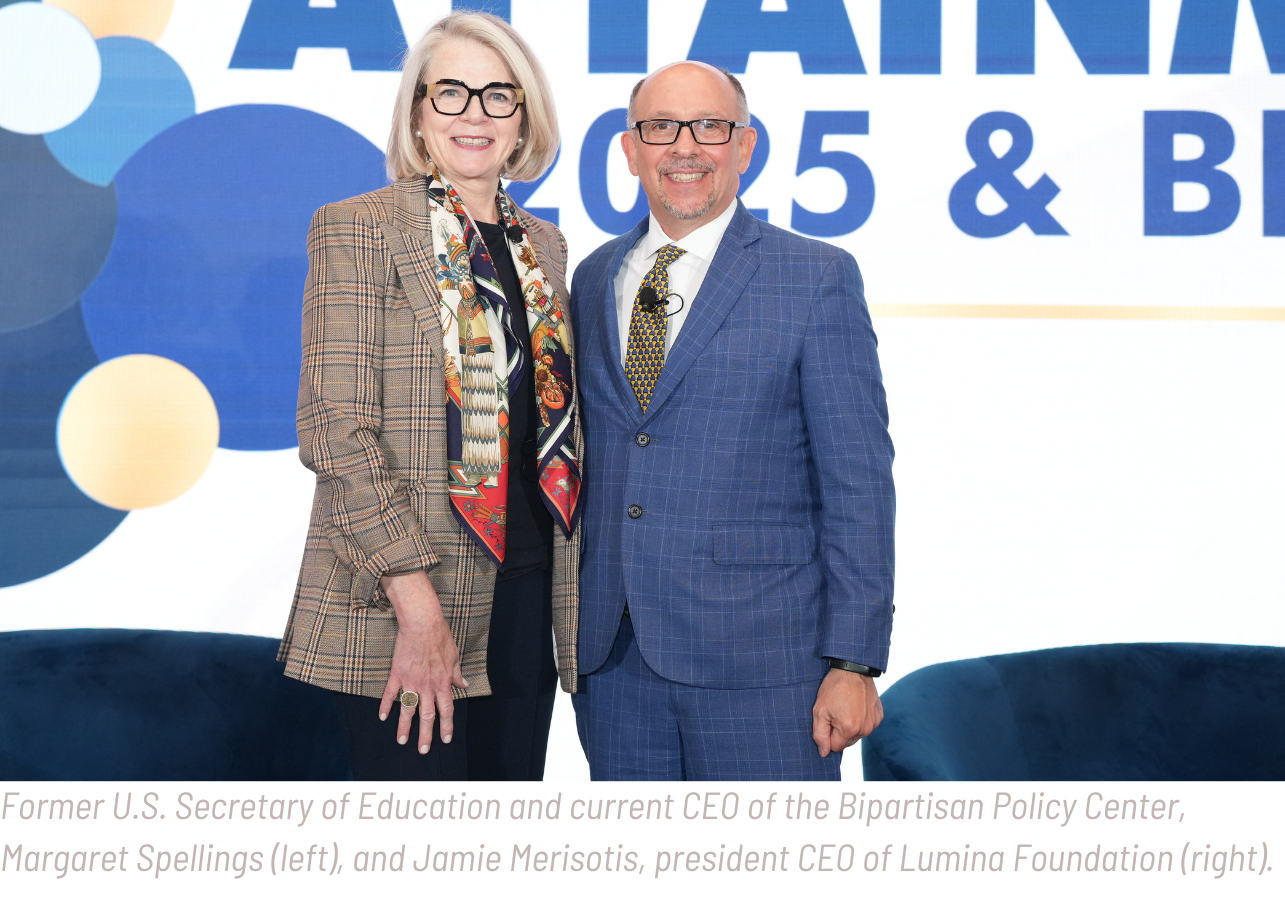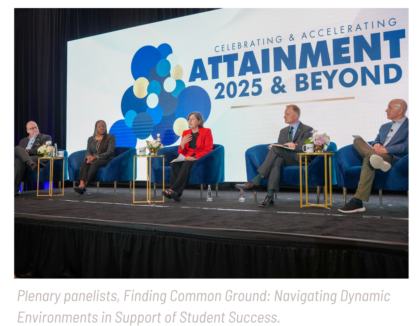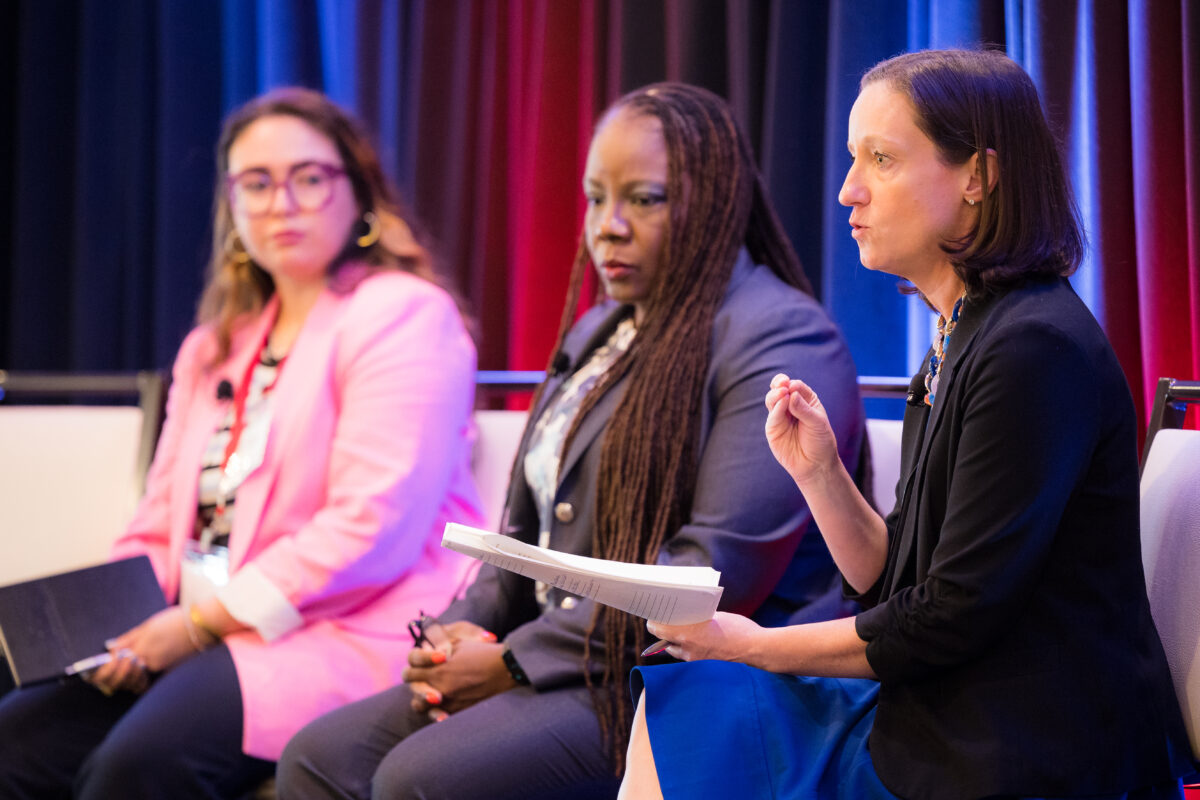Accelerating Postsecondary Attainment: Event Highlights and Reflections
Published Apr 17, 2025
The Celebrating and Accelerating Attainment: 2025 & Beyond convened nearly 500 institutional leaders, researchers, funders, and student success practitioners in Washington, D.C. on April 2 and 3. The Institute for Higher Education Policy (IHEP) served as managing partner for the event which was made possible with generous support from nine philanthropic partners. The days’ conversations highlighted field-driven progress in accelerating postsecondary degree and credential attainment and set bold intentions for helping even more individuals earn credentials of value.
Reflections, Lessons, and the Road Ahead
The event kicked off  with a conversation between Margaret Spellings, eighth U.S. Secretary of Education and current president of the Bipartisan Policy Center, and Jamie Merisotis, CEO of Lumina Foundation. The pair offered insights about how public discourse on the value of higher education has evolved and where it must go next.
with a conversation between Margaret Spellings, eighth U.S. Secretary of Education and current president of the Bipartisan Policy Center, and Jamie Merisotis, CEO of Lumina Foundation. The pair offered insights about how public discourse on the value of higher education has evolved and where it must go next.
“We’re getting more attention in the public sphere than we have for a long time. And that’s a real opportunity,” Spellings said. “The eyes of the world are on us and the centrality of what we do.”
Student-Centered Solutions Drive Attainment
Student-centered solutions were a recurring theme on the mainstage, in breakout sessions, and other conversations.
“Center student voice, not in a performative way, but in an authentic way,” said Karen Stout, president and CEO of Achieving the Dream. “In times of uncertainty, we really need to go back to our roots and understand the students we’re serving.”
Other panelists echoed the importance of making practical adjustments, such as eliminating unnecessary procedural hurdles, to help students, particularly those from underserved communities, navigate systems more effectively and stay on track toward graduation.
Rebuilding Public Trust Through Local Connection and Common Cause
The higher education field is navigating headwinds with changing federal policies, economic conditions, and  shifting student and institutional needs. Amid this complexity, speakers emphasized the importance of engaging policymakers and communities in conversations grounded in shared values and specific ways higher education connects with people’s day-to-day lives.
shifting student and institutional needs. Amid this complexity, speakers emphasized the importance of engaging policymakers and communities in conversations grounded in shared values and specific ways higher education connects with people’s day-to-day lives.
Yolanda Watson Spiva, president of Complete College America highlighted a tension: “Most people feel very excited, proud, and love their local community college or their local college, but they have some negative feelings about higher education writ large.”
Spiva and fellow panelists urged leaders to break through those perceptions and show how their institutions reflect community values, fuel economic growth, and support local talent retention.
Investing in Data and Resources for Today’s Learners
Conversations also explored how to better serve learners who attend college after years in the workforce and students who return to college after pausing their studies. Jessica Wiggins, associate vice president of enrollment management at Jacksonville State University, discussed a new center to support adult learners and transfer students with specialized advising and resources.
“We’re doing our best to do an assessment of our student’s needs, preferences, but also their success rates in different times,” Wiggins said. “Our hope is that the center will be a place that students, whether it’s their first time or they’re returning, will be able to go and get the help that they need.”
From reengaging students with enough credits to graduate but no awarded degree, to addressing melt among accepted students, data can help institutions identify and remove barriers to degree or credential attainment. Several discussions also called for stronger alignment between education and workforce data systems to ensure credentials connect meaningfully with career pathways.
Ensuring Degrees Deliver Real Value
What makes a degree valuable? That question was asked and explored throughout the event. Mike Flores, chancellor of Alamo Colleges District—home to 88,000 students, 78% of whom are students of color—described value as multifaceted.
“It’s about return on investment, yes, but also, about the benefit to individuals and their families, the value to employers, and the economic impact generated through increased wages tied to that credential,” Flores said.
For many, the value of a degree extends far beyond financial returns. It’s also about contributing to one’s community, finding purpose, and building a better future for the next generation. Bonnie Zeiler, a recent graduate of Jacksonville State University, conveyed this sentiment powerfully. After spending decades as a successful Licensed Practical Nurse, Zeiler returned to college in 2018 to earn a degree to reach her goal of becoming a nursing home administrator.
“At the age of 50, I finished what I started [decades ago] and became the first person in my family to earn a college degree…There are thousands of other working adults who have done the same, and thousands more who want to do the same,” Zeiler said, underscoring the potential of adult learners who, with the right support, can achieve their educational goals and unlock new opportunities.
Higher Education as a Pillar of Democracy
Melody Barnes and John Bridgeland, former directors of the White House Domestic Policy Council, explored how higher education can foster civic engagement and rebuild  public trust. Barnes, who served in President Barack Obama’s administration and Bridgeland, who served in President George W. Bush’s administration, share a commitment to education and democracy as co-chairs of More Perfect.
public trust. Barnes, who served in President Barack Obama’s administration and Bridgeland, who served in President George W. Bush’s administration, share a commitment to education and democracy as co-chairs of More Perfect.
“Higher education has been an important source of social mobility, innovation and discovery, and community strength” Barnes said. “We have to start with a mindset of abundance of the utility, versatility, creativity, and imagination in our institutions.” Bridgeland described higher education as a deeply human endeavor. “The non-economic value matters, too. Personal fulfillment, giving back—these are the things that make a life.”
Their words were a fitting capstone to the event’s robust discussions: millions more learners equipped with credentials of value means a workforce ready for tomorrow, a democracy strengthened by informed, engaged citizens, and a nation where more people have a real opportunity to thrive.
Watch to learn more about the future of the attainment movement:
This event was made possible by generous support from Ascendium Education Group, College Futures Foundation, ECMC Foundation, Gates Foundation, The Joyce Foundation, The Kresge Foundation, Lumina Foundation, Strada Education Foundation, and Trellis Foundation.
Photos courtesy of Lance Omar Thurman Photography. Video produced by Corcino Productions.


